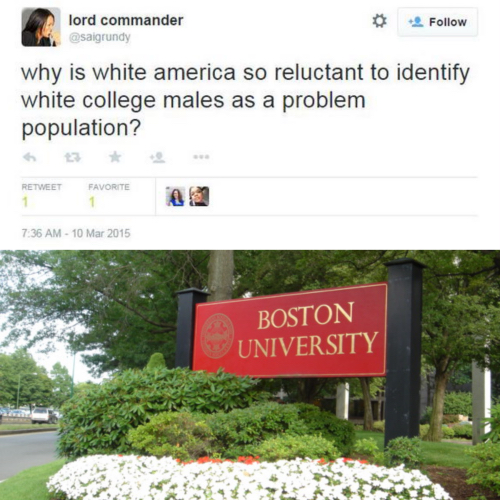
In an e-mail sent to all Boston University students and staff, BU president Robert A. Brown has responded to the growing controversy surrounding newly appointed assistant professor Saida Grundy. Grundy, who will become an assistant professor in the Department of Sociology, with an additional appointment in African American Studies, came under fire for a series of statements she made via Twitter about toxic white male masculinity and slavery she made over Twitter.
May 12, 2015
To the Boston University Community:
Many members of our community are aware of comments made on social media by Dr. Saida Grundy, who on July 1st will become an assistant professor in the Department of Sociology with an additional appointment in African American Studies.
Dr. Grundy’s comments are receiving extensive coverage in the media; we are also hearing from alumni, friends, and others about them. Many have expressed the view that some of Dr. Grundy’s comments are offensive and/or racist.
At Boston University, we acknowledge Dr. Grundy’s right to hold and express her opinions. Our community is composed of faculty, staff, and students who represent widely varying points of view on many sensitive issues.At the same time, we fully appreciate why many have reacted so strongly to her statements. Boston University does not condone racism or bigotry in any form, and we are committed to maintaining an educational environment that is free from bias, fully inclusive, and open to wide-ranging discussions. We are disappointed and concerned by statements that reduce individuals to stereotypes on the basis of a broad category such as sex, race, or ethnicity. I believe Dr. Grundy’s remarks fit this characterization.
I do not say this lightly or without a great deal of consultation and soul-searching. I understand there is a broader context to Dr. Grundy’s tweets and that, as a scholar, she has the right to pursue her research, formulate her views, and challenge the rest of us to think differently about race relations. But we also must recognize that words have power and the words in her Twitter feed were powerful in the way they stereotyped and condemned other people. As a university president, I am accustomed to living in a world where faculty do—and should—have great latitude to express their opinions and provoke discussion. But I also have an obligation to speak up when words become hurtful to one group or another in the way they typecast and label its members. That is why I weigh in on this issue today.
Too often conversations about race quickly become inflamed and divisive. We must resolve to find a vocabulary for these conversations that allows us to seek answers without intemperance, rancor, or unnecessary divisiveness. We expect our faculty members to strive to create this environment in their classrooms.
I also understand that some members of our faculty believe that any equivocation by the president is tantamount to not supporting a new colleague. To those who feel that way, I ask that we talk rather than jump to conclusions. I recognize this is a difficult issue and I welcome the chance to talk with all of you and Dr. Grundy about it.
Only when we hold these conversations will we—as an academic community, with our educational programs, research, and scholarship—meet the standards we set for ourselves.
Sincerely,
Robert A. Brown
President
While many right wingers called for Grundy to be fired, with a group of her critics even launching a petition for that cause, supporters of Grundy saw her Tweets as an opportunity to have a really charged conversation out in the open.
A counter petition was launched, as well as a hashtag #IStandWithSaida which spurred compelling dialogue and featured messages of support for Dr. Grundy.



[…] we reported this morning, racially-charged tweets by Dr. Saida Grundy, an incoming professor at Boston University, have been […]